Summer Wars
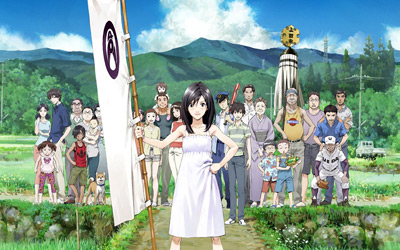
Summar Wars is director Mamoru Hosoda‘s second feature film (that counts) since the unexpectedly successful Toki wo Kakeru Shoujo, which rose from obscurity by word of mouth. Summer Wars is the second child in the family, the one who has to live up to the expectations of others to supersede the greatness that came before it. Did it succeed? My feelings are mixed.
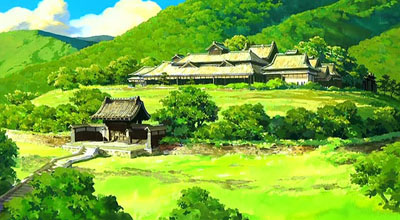
As Hosoda himself puts it in interviews, Summer Wars is a movie about family, particularly a large traditional Japanese family. Just as Tokikake uses time travel to tell the story of a teenage girl’s inner uncertainties about love and growing up, Summer Wars is a story about family love and human communication wrapped in a soft sci-fi story.
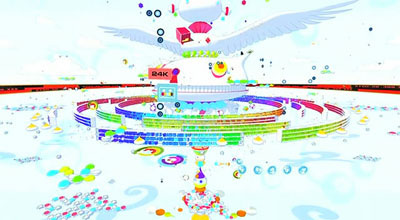
The movie takes place in a slightly more advanced version of modern Japan, where the internet has evolved into a virtual world not unlike Second Life. This network is called the OZ and it can be accessed from a variety of devices that look remarkably similar to various real-life intellectual properties. Every user is represented by a personal avatar and uses it to get things done in the OZ. Every action in the OZ is represented by symbolic representations of its real-life equivalent (i.e. a key for a password lock and what not).
Or to put it simply, OZ is pretty much what people in the 90s imagined the future of internet to be because the real internet is too boring to be the setting of a movie.
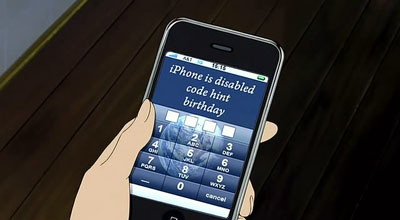
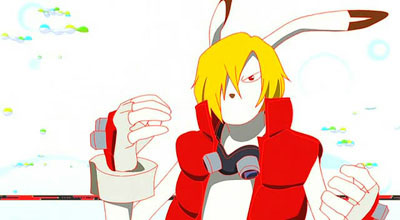
In the movie, OZ is being attacked by an unknown hacker (guest starring Anonymous) who goes around “stealing” people’s avatars in order to gain their access rights to various systems. As is typical of the Hollywood Hacking trope, every critical system in the world is connected to this virtual funland. Oh noz.
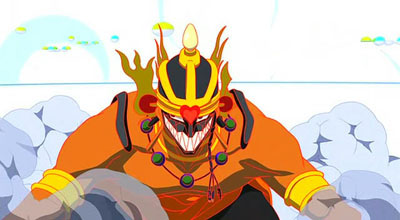
The main character is Kenji Koiso, almost IMO representative for Japan, who is good with computers and works part-time as a OZ administrator (i.e. kind-hearted geek with l33t skills). He is invited by his senpai Natsuki Shinohara (i.e. hot older girl) to help out at her grandmother’s birthday celebration. There, he meets the rest of the Jinnouchi family, a long line of warriors whose ancestors fought the Tokugawa shogunate and held great influence in Japan. On some level, there’s a “tradition meets modernity” theme going on, but its prominence in the story is slight at best.
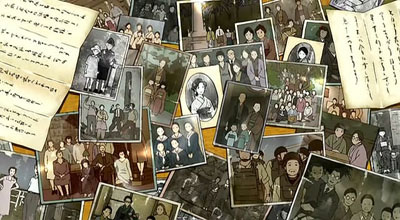
The direction that the story takes should be quite clear from this initial set-up. Boy meets girl (and extended family) and By Their Powers Combined™ they unite to save the world. There are few surprises to be found in Summer Wars and its plot is definitely not one of its strong points. The story has about as much subtlety as a super villain in a 80s cartoon. Compared to Tokikake, this is a step backward in some sense, but perhaps that is simply because Summer Wars is a different kind of movie. (Or it’s just not as good…)

The most interesting part of Summer Wars is probably the Jinnouchi family, a diverse group of people whose mundane banters are strangely entertaining. In today’s world where nuclear families are becoming the norm (and in fact seems to be the only form of family ever depicted in anime), the Jinnouchi family presents an engaging and appealing look into an increasingly rare kind of social structure — that of a big traditional family that has adapted to the challenges of modern society without losing its sense of identity.
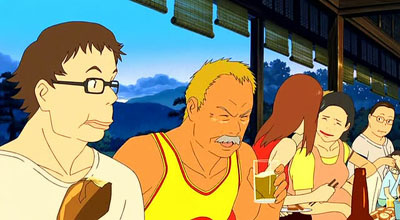
As an Asian coming from a culture bearing similar concepts, there are many elements in the film that I personally find endearing, but your mileage may vary on this count. At the very least, the humorous interactions between the diverse range of characters in the Jinnouchi family should make for some heart-warming moments.
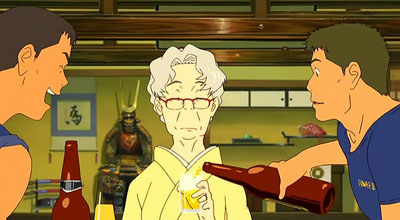
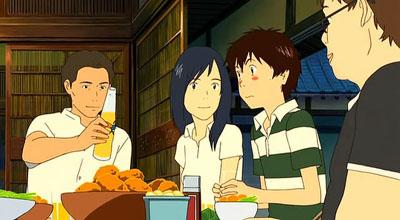
I find the OZ portion of Summer Wars and its whole associated storyline to be the weakest part of the movie. Sure, the action scenes and the depictions of 3D virtual world are somewhat entertaining, but they do not mesh well with what appears to be the main focus of the film — the Jinnouchi family. The role OZ plays in the movie is of dubious importance and the final “crsis” feels too convenient as a plot device.
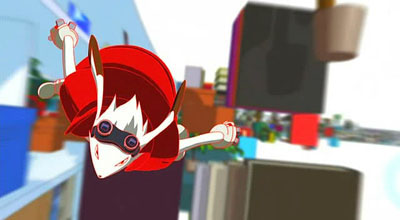
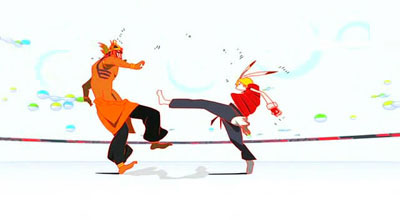
I suppose the sci-fi angle is meant to be the flashy gimmick used to draw the audience in to the real underlying message, but it ends up being more of a distraction. As I previously stated, I believe that on some level the original intent was to create a contrast between this wildly futuristic idea of the internet and the traditional values represented by the family. Unfortunately, only a few feeble attempts were made to actually develop this tenuous link into a coherent message.
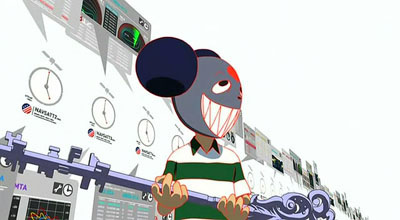
Character development in the story is practically non-existent. Where it does exist, it’s really not any good. Considering the story’s premise and Kenji being depicted as slightly socially awkward, one would expect some kind of character growth to occur as a result of his interactions with the Jinnouchi family (he practically said as much himself at one point in the movie), but that doesn’t really happen. In fact, for a main character, he does surprisingly little throughout the movie. Oh sure he gets the girl in the end, but for what reason beyond playing to audience expectation I just can’t say.
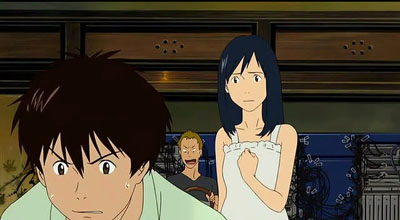
Of course, every work of fiction is flawed in some ways especially given how much of it is subjective. Hence, it’s not about how many rights or wrongs, but whether the things that are done right are more important than the wrongs. Summer Wars, in spite of all its execution flaws, provides an extremely enjoyable and heart-warming experience that will hopefully leave a longer-lasting impression than its abysmally bad sci-fi component. Well, it did for me anyway.
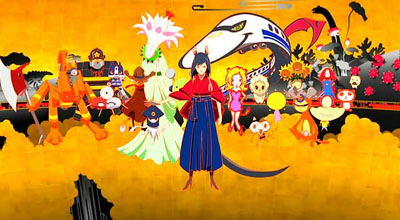
To sum up, Summer Wars has its moments and is on the whole likeable and decent, but I expected more from a follow-up to Tokikake. Of course considering the fact that everyone else is hailing it as the second coming of Hayao Miyazaki (a comparison which frankly boggles my mind… They are both Japanese?), maybe it’s just me being an unappeasable jerk as usual.
Those who are in Singapore can catch it in most Cathay cinemas. Just bring with you some rudimentary understanding of Japanese because the subtitles are terribad. White on white? Jeez.
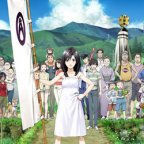




![[Insert Anime Title] - Episode [Insert No.]](/websites/www.darkmirage.com-pre/blog/wp-content/uploads/pth/thumbnail_07_screencap.jpg)

Trackback from
Summer Wars | JapanFebruary 27th, 2010 at 10:10 pm
[...] { $('body').addClass('noback'); }, function () { $('body').removeClass('noback'); }); }); Summer Wars Summar Wars is director Mamoru Hosoda’s second feature film (that counts) since the unexpectedly [...]
February 27th, 2010 at 10:24 pm
Just saw it last night. I thought the OZ portion actually play an important role in theme and story, but it’s like everyone likes to knock it. Maybe people need to watch more Saki.
The character development bit is as you said, and it would improve if they managed to extend the family interaction stuff. I think it was sufficient as is however; it’s not /that/ kind of a film.
February 27th, 2010 at 11:48 pm
Was the success of Toki o kakeru shōjo really that unexpected? After all, it’s an adaptation/sequel of quite successful novel and 80′s live-action film, made by renowned studio… Seems to me the blockbuster status was guaranteed from the very beginning.
February 28th, 2010 at 12:22 am
I actually found Summer Wars more entertaining than TokiKake. The former didn’t have a boring moment(for me at least) but the latter had lots of quiet moments where the characters just stare into blank space and ponder something. Meh. Maybe it’s because of the lack of action in TokiKake.
February 28th, 2010 at 12:28 am
I found it more entertaining than Tokikake as well, and it had a lot of hidden messages like how OZ is supposed to be our future, and how easily the system can be broken and people’s identities and even lives are stolen/lost. It is sort of like telling us we should not be dependent on technology, but not very strong at it.
More of it is on the family values and the times they bunched together during the entire show even after being split up in various ways, like Shota and the rest of them, how the women and men acted differently, and how they all banded together to stand with Natsuki. More for the family as a watch, I suppose.
The subtitles were fine if you could understand the Japanese though, too bad I never knew there was a card game called hanafuda. Understanding it might not have been as crucial to the movie as one might think, but it might provide insights.
February 28th, 2010 at 1:50 am
As I said, I too think that the OZ thing is meant to play an important role, but I would argue that it didn’t actually manage to do that…
And I actually found the Hanafuda (unrelated: read up on Nintendo’s history) part rather contrived… Like it’s the movie telling me “here’s the link between the two parts of the movie you’ve been looking for”. But it’s really not.
As for the OZ itself, I’ll say that any message found in there is rather diluted by its lack of substance. It’s not speculative science fiction in the sense of Arthur C Clarke, but more like generic Y2K doomsday with some visual fluff added. I won’t really call that a hidden message.
I won’t argue that it’s more entertaining than Tokikake. But it’s somewhat less meaningful than I imagined it to be from the interview Hosoda gave. Certainly not as well-written as Tokikake, which I suppose had the benefit of being a novel first.
February 28th, 2010 at 11:59 am
Yeah, I was expecting better when I watched it, but I was pretty disappointed about the whole OZ angle of the story. I mean, it was so damn clichéd and I was wondering if this was written by Hollywood writers.
On the other hand, I did greatly enjoy all the parts with the Jinnouchi family and if they had replaced the “OZ threat” with some other things, I think the whole movie would have been a 9 or 10 for me. As it stands, it’s pretty much a 6 thanks to how contrived the whole thing was.
To be honest… I think the main character should’ve been the grandma. Main guy’s too forgettable and only does the deus ex machina parts. Natsuki herself isn’t too endearing either, haha.
February 28th, 2010 at 8:08 pm
Wow, Kuro is harsher than me… Actually I agree with you that it would’ve been a better movie if they replaced the OZ part with something less clichéd as the source of tension.
Then again, it would arguably be a whole different movie and lose the whole “modernity vs tradition” angle, though I personally find that part of the movie’s message so weak that it might as well not be there.
March 1st, 2010 at 8:46 am
I agree on the fact that Summer Wars was a bit of a let down and the fact that the theme was not well developed. Just one question: what the hell is Tokikake? Nvm I’ll google it.
March 1st, 2010 at 8:47 am
Yeah I liked Tokikake bettter… (I forgot it’s name)
March 1st, 2010 at 4:53 pm
I am looking forward to seeing this, thank you for the review. I really enjoyed Tokikake, but I think I will go into this with low expectations and hopefully be pleasantly surprised :)
March 1st, 2010 at 8:48 pm
The Miyazaki thing may have to do with the female leads. Throughout the movie, Natsuki has shown to be made of tougher stuff than Kenji
Personally I thoroughly enjoyed the movie with it’s family aspect. I was expecting more from OZ after Hosoda’s interview at AFA but I guess any depth was sacrificed for a more entertaining movie, not that I mind though.
March 5th, 2010 at 3:22 am
After talking with Hosoda Mamoru about Summer Wars and chilling with him before the New England premiere at my school, …well I guess that makes me obviously biased. xD I really enjoyed it because it kept me thinking for a long time afterwards. Like about the power of the old, the role of the internet, family, etc. Compared to Miyazaki, Hosoda really knows how to appeal to a modern audience. There were to many times in the movie where I thought about my family and how we’re so alike. Idk…
Trackback from
Kurogane's Anime Blog » Summer Wars Impressions.March 8th, 2010 at 12:58 am
[...] course, like DarkMirage, the whole subplot involving the virtual world of OZ and Hollywood Hacking is definitely not the [...]
March 13th, 2010 at 3:33 am
It could’ve been great if they didn’t add the entire Oz thing. Heck, the movie didn’t even require any sort of ‘conflict’. It’s just producers and writers playing safe…It’s a lot harder to sell a movie in which ‘nothing really happens’…adding a doomsday scenario is just taking the easy way out. More emphasis on relations, emotions, social interactions,…and it could’ve been magnificent.
I’m also getting tired of the verrrrrry bland vision most anime directors have of the future. Or the world has perished and it’s a post-apocalyptic scenario…or somehow the entire world has embraced cartoony stuff as serious business. Oz is the latter…it’s just so freakin’ hard to take serious…it’s so obviously the dream scenario of some otaku on LSD.
April 21st, 2010 at 1:32 am
Well I for one thoroughly enjoyed the OZ back story. The graphics are amazing and everything about it just looks so cool and whimsical. I know we already have Second Life, but I think a real life OZ-like virtual network would be even cooler. That said, I also enjoyed the family aspects of the movie; it was a compellingly realistic and nostalgic foil to the fantastic futurism of OZ. Overall, this was a terrific movie for me.
May 1st, 2010 at 1:57 pm
I thought this anime just a copy paste from Digimon movie…just change Omegamon into that rabbit that the best black-skinned shota character have^^
July 7th, 2010 at 10:03 pm
Watched this sometime back at Cathay. Yah, knowing alittle japanese does help.
Generally, it was a rather so-so show for me. Pretty hard to compare with Tokikake, Tokikake had more time for character development and growth. For Summer wars, the focus was on the crisis in OZ ,although they were trying to talk about family values and how family should stay together in time of crisis (I think). I actually saw OZ as the equivalent of the “real-life”, how the family got together to trap “love-machine”, okay, in this case, just the men got together.
But on the other hand, it attempted to demonstrate the different personalities in a family.
The exciting part was actually at the Hanafuda match, where the little guy came to lend his account… haha… (I could have been bored by then… I don’t know or maybe it was cause I rushed down from work).
I think the producer was trying to link the idea of family in time of crisis and trying to modernize it for easy relation. But I guess this was not really brought forward clearly…
But as a pure entertainment show, this will do.
July 9th, 2010 at 6:43 pm
As an IT student I enjoyed this movie very much, I find the OZ plot as a very important spice in the story, there’s so much into Summer Wars that I can’t leave on my seat while watching it.
October 6th, 2010 at 1:11 pm
Make OZ real is my view of things. The movie is moving for it isn’t all romance. Just a little while family bonds are being made and fantastic action sequences are in place! The animation is good, but back to the fact that OZ would be awesome. It would be a huge hit i’m sure! Todays technology should hurry up and upgrade!
November 24th, 2010 at 12:53 am
I managed to catch the English-dub premiere this past weekend. I have to say is that it’s a good movie that shows the importance of family.
Though I feel that the movie is telling us to be more responsible when it comes to technology.
I wrote about the movie at: http://www.mangatherapy.com/post/1659502530/summer-wars
I wonder what will happen when we see a world like Oz in the future….